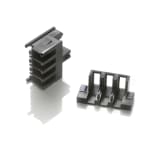 Royal DSM, a global science-based company active in health, nutrition and materials, is adding hydrolysis-resistant grades of polybutylene terephthalate (PBT) to its Arnite® family of thermoplastic polyesters. The new materials will provide a cost-effective solution in applications exposed to humidity and high temperatures, including automotive connectors, control devices, and sensors.
Royal DSM, a global science-based company active in health, nutrition and materials, is adding hydrolysis-resistant grades of polybutylene terephthalate (PBT) to its Arnite® family of thermoplastic polyesters. The new materials will provide a cost-effective solution in applications exposed to humidity and high temperatures, including automotive connectors, control devices, and sensors.The new ‘HR’ grades come in response to increasing calls in the automotive market for materials that resist hot and humid environments, for applications that do not necessarily require the outstanding performance of high temperature polyamides like DSM’s Stanyl® PA46 and ForTii® PA4T products.
“Our customers are telling us that with continuous-use and peak temperatures around the engine continuing to rise, materials like polyamides 6 and 66 and standard PBT are no longer good enough for the job in some applications,” says Mark Terlaak, Global Segment Leader, Automotive Electronics. “Many Tiers see HR PBT as a bridge between these materials and more expensive specialty solutions."
Terlaak also points out that PBT scores over standard polyamides for automotive electronic applications because it does not require the use of heat stabilizers (some of which are the source of corrosion problems on metal contacts) and because its lower moisture absorption leads to higher dimensional stability.
The new Arnite HR grades stand out from the pack of PBTs in many ways, but most notably in their higher retention of mechanical properties after USCAR Class 3, 4, and 5 temperature/humidity profile exposure and ‘85/85’ cycles (85°C/85% relative humidity) of up to 3000 hours. Terlaak also notes that performance at 150°C is exceptional. “Our grades will outperform virtually all the competition in terms of flow, speed of crystallization – which translates into production cycle time – and mechanical property retention over the lifetime of the vehicle,” he adds.
When targeting the performance it wanted to achieve from the Arnite HR family, DSM took into consideration not only the needs of the automobile industry today, but also how they are likely to change in the future. The new grades have been engineered in anticipation of more robust testing and validation standards as the trend towards electric-powered and autonomous road vehicles picks up.
DSM is launching the new Arnite family with two 30% glass reinforced grades, one with enhanced silicone adhesion. When complete, the range will include grades with various levels of glass fiber reinforcement, flame retardant grades with UL 94 ratings of up to V-0 at thicknesses as low as 0.4 mm, impact-modified grades, and grades engineered to provide high levels of adhesion to silicone sealants.
“The addition of this new Arnite PBT family strengthens our position as one of the few plastics suppliers in the world with a full-service automotive electronics portfolio,” Terlaak concludes.
Source: DSM



